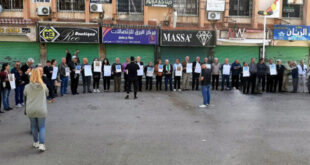Hasaka, SANA – The agricultural sector in Hasaka province has witnessed tangible progress during the last two years thanks to the victories achieved by the Syrian Arab army all over the country and the governmental procedures taken in this regard to support peasants.
The progress in agriculture is clearly manifested by increasing cultivated areas and improving productivity of strategic crops (cereals and cotton) and supporting animal resources through all possible means.
The Government’s support to peasants has varied between providing fodder around the year and issuing decisions which have enhanced farmers and producers’ confidence in the government’s role in settling their situation and increasing production.
According to the General Establishment for Cereal Processing and Trade – Qamishli Branch’s 2015 statistics, 315,188 tons of wheat and 95,228 tons of barley have been delivered to the reception centers in the city.
Head of the Establishment, Obaida Abdul-Hami, in a statement to SANA Economic Bulletin, said that production has remarkably increased in comparison to previous years, expecting a rise in numbers during the current season as a result of the increase in cultivated areas and the improvement of security which contributed to enhancing stability in agricultural production.
He added that wheat stockpile reached 322,663 tons while the amounts of wheat shipped to other provinces estimated at 257,120 tons.
Attallah al-Najm, head of Hasaka Cotton Ginning Factory, said that the amount of cotton delivered to the two reception centers in Hasaka amounted to 23 thousand tons.
He noted that the total amount of cotton expected to be received this season is estimated at 26 thousand tons, indicating that opening reception centers in Hasaka, increasing cotton price and other governmental procedures have encouraged farmers not to sell their production to tradesmen who used to smuggle cotton to Turkey.
Director of the Agricultural Cooperative Bank in Hasaka Khudr al-Heso said that the bank has distributed 26,384 billion SYP, 23,684 of which in turn for wheat and barley delivered to reception centers, while the total sums paid in turn for cotton amounted to 2,700 billion SYP.
Director of Agriculture and Agrarian Reform in Hasaka province, Amer Selo noted that the total area planted with irrigated wheat and barley reached 135 thousand and 17,500 thousand hectares successively, while rain-fed wheat and barley areas were estimated at 227 thousand and 318 hectares consecutively, in addition to 46 thousand hectares of lentil.
He underlined the Cabinet’s approval to increase the total cultivated areas to 32,390 thousand acres to be planted with irrigated wheat.
For his part, head of General Organization for Seeds Multiplication – Hasaka branch, Ayid al-Hussein, said that the branch has distributed 5211 tons of wheat and 4644 tons of barley to farmers.
The FAO seeds grant, including 10 thousand packs, has been recently distributed as each beneficiary has received a pack of 200 kg of wheat and barley seeds, he added.
Sales of Fodder Establishment in Hasaka province has amounted to one billion eight hundred million Syrian pounds in 2015.
Statistics of Agriculture Directorate in Hasaka show that there are 1,638 million sheep, 84,741 cows, 222,199 goats and 3871 horses in the province.
Head of the General Peasants’ Union in Hasaka, Mohammed al-Khleif, stressed the importance of unifying efforts to overcome obstacles and provide support to peasants who represent the majority of workforce in the province. This includes reducing the impact of the current crisis, exempting farmers from accumulated debts, providing agricultural production equipment, particularly fertilizers, and compensating farmers and owners of large-scale agricultural projects for their losses caused by terrorism.
R.Raslan/Mazen
 Syrian Arab News Agency S A N A
Syrian Arab News Agency S A N A

